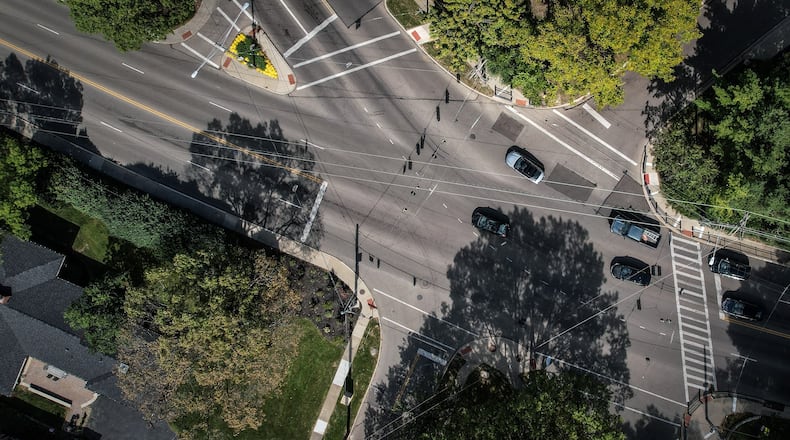The roundabout option will be studied as part of a master plan Oakwood has commissioned on upgrading its 17 traffic signals, 10 of which are on Ohio 48/Far Hills.
Credit: STAFF
Credit: STAFF
“This study will hopefully conclude with a recommendation on whether we should seriously talk about something dramatically different,” such as a roundabout, Oakwood City Manager Norbert Klopsch said. “At this point, I have no idea if that’s even feasible or practical.”
Ohio 48 is one of the most traveled roads in the Montgomery County suburbs south of Dayton. The average number of vehicles using it daily ranges from about 14,700 at Stewart Street in Dayton to more than 41,500 at Interstate 675 in Centerville, Ohio Department of Transportation records show.
Roundabout projects either planned, being constructed or completed on state routes in Ohio include one in Allen County and four in Butler County, according to documents.
The estimated cost for such a project on Ohio 309 near Lima is $4.6 million, according to ODOT.
The goal of Oakwood’s study by Crawford, Murphy & Tilly (CMT) of Columbus is to create a plan that “maximizes the opportunity to leverage federal and state grant dollars to assist in what will be a multimillion-dollar endeavor,” city records state.
Whether or not Oakwood ultimately opts for a roundabout, rebuilding its traffic signals is expected to be costly. A recent proposal to replace lights at one intersection in Kettering came in at more than $340,000.
Oakwood will pay CMT $133,446 for the master plan, which is expected to be completed by Jan. 31, 2023, city records show.
It should provide a document that would include the estimated cost and the duration of the proposal for all traffic-signaled intersections, which Klopsch suggested could be five to 15 years.
Credit: JIM NOELKER
Credit: JIM NOELKER
In Oakwood’s particular case, “a roundabout has operational and safety benefits that may not be possible with a signalized, six-leg intersection,” CMT’s proposal states. “The conceptual improvement plan will identify potential right-of-way impacts that will be factored into the total cost of the project.”
Roundabouts “are growing in popularity as more and more transportation agencies recognize the increased safety and traffic-moving efficiency they bring to intersections,” ODOT’s website states.
Klopsch said “the critical part of it is that you have … land to build a roundabout. And also that traffic volumes in the various directions and the pedestrian traffic is such that a roundabout would, in fact, offer the level of service desirable.”
Aside from the land, other considerations include:
•The traffic signal at that intersection is the “controlling one in the cycle length” of Far Hills stop lights in Oakwood, Klopsch said. With six directional approaches, that length is comparatively longer than standard four-way lights.
“Typically, the longer the cycle length, the longer people have to wait on the cross street … to get a green light,” he added.
•The downhill/uphill approach to the intersection. Ohio 48′s path in Oakwood is about two miles, with a one-mile stretch nearest Dayton involving curves and inclines, “where, naturally, the higher speeds are realized,” Klopsch said.
About the Author



